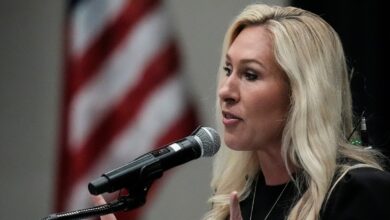Opinion | Trump’s War on D.E.I. Is Really a War on Civil Rights

The genius of the right-wing crusade against “diversity, equity and inclusion” is that the term is amorphous enough that it can mean many different things to many different people.
To a certain set of well-meaning cultural liberals, D.E.I. refers mainly to H.R. mandates and ineffectual diversity training. If those people work in progressive nonprofits or any other space that attracts young, left-leaning people, D.E.I. might also mean the aggravating use of clumsy acronyms like “BIPOC” or linguistic inventions like “Latinx.”
For people of a more moderate or conservative persuasion, D.E.I. might mean affirmative action and the elevation of unqualified people to sensitive and high-status positions. (Although how one knows they are unqualified is often left unsaid.) It might also mean public adherence to liberal shibboleths about diversity — “virtue signaling” by “woke elites” in academia and the corporate world.
There is also a related (and not altogether incorrect) view from the political left that D.E.I. is just a smoke screen for capital and its servants — a multicultural gloss on the neoliberal agendas of the managerial classes, whether corporate bean counters or university administrators.
The upshot of the many meanings of D.E.I. is that when President Trump announced, at the start of his term, that he wanted to uproot D.E.I. from the federal government, there was some sympathy — and even agreement — from those who are otherwise opposed to the administration and its overall program. If nothing else, effectively ending the battle over D.E.I. might clear the space for a different kind of politics, less focused on diversity and inclusion than more material concerns.
But then we have to remember that D.E.I. also means something to people on the political right, from the reactionaries who lead the White House to the propagandists who carry their message to the masses. For them, D.E.I. is less “white fragility” and silly posters about “white supremacy culture” than it is the mere presence of a woman or nonwhite person or disabled or transgender person in any high-skilled, high-status position. And their alternative isn’t some heretofore unknown standard of merit; it is the reintroduction of something like segregation.
Consider the ways the administration has tried to implement the president’s executive encyclical against D.E.I., which called for federal agencies to “relentlessly combat private sector discrimination” and “faithfully” advance “the Constitution’s promise of colorblind equality before the law.”
At the National Security Agency, it has meant an effort to purge all N.S.A. websites and internal networks of banned words such as diversity, diverse, inclusive, racism and racial identity. Over at the Department of Defense, led by Pete Hegseth, a former Fox News host, it has meant the end of official recognition of Black History Month, the disbanding of affinity groups at service academies, and a move to curb military outreach to Black professionals in engineering and the sciences. Diversity, Hegseth says, is “not our strength.” At the National Institutes of Health, displays honoring women and scientists of color have been removed, and at the National Science Foundation, program officers have reportedly been directed to reject grant applications that mention anything related to diversity, equity, inclusion or accessibility.
There’s more. In addition to purging the Department of Justice of anything that smacks of D.E.I., Attorney General Pam Bondi has instructed the agency to target private-sector diversity programs for potential “criminal investigation.” A firm that wants to increase its proportion of women employees or place more Black Americans in corporate leadership may find itself in the cross hairs of the federal government.
You’ll find the surest evidence of the real meaning of the president’s anti-D.E.I. order in the fact that he also dismantled a decades-old requirement, originally promulgated by President Lyndon Johnson, that federal contractors try to employ more women, Black Americans and, in the years since, other people of color. One imagines that Johnson’s opponents, like the segregationist senators James Eastland and Strom Thurmond, would have been pleased to see his handiwork — and that of a generation of civil rights lawyers — tossed aside with the stroke of a pen.
The segregationist intent of the president’s policy is even more apparent when you turn your attention to some of the people he has chosen to place in his administration. For example, not long after he pledged to root out every federal worker involved in diversity efforts, Trump appointed Darren Beattie to serve as acting under secretary for Public Diplomacy and Public Affairs at the State Department. Beattie was previously known for being fired from his job as a Trump speechwriter in 2018 for appearing at a conference attended by white nationalists in 2016.
His views haven’t changed. “Competent white men,” Beattie wrote last October, “must be in charge if you want things to work. Unfortunately, our entire national ideology is predicated on coddling the feelings of women and minorities, and demoralizing competent white men.”
“Competent white men must be in charge” is as close to a rallying cry as I can imagine for the Trump administration although, of course, it strains credulity to say that either Donald Trump or his subordinates count as competent.
The president, for his part, has voiced similar sentiments since taking office. In the wake of a deadly air crash, Trump blamed diversity efforts in hiring for the accident. He has also, as my newsroom colleague Erica L. Green notes, aligned himself with “those who are brandishing the term D.E.I. as a catchall for discrimination against white people, and using it as a pejorative to attack nonwhite and female leaders as unqualified for their positions.”
The administration’s war on D.E.I. is of a piece with a broader effort to turn the nation’s civil rights laws upside down, taking weapons forged to fight racial subordination and wielding them, instead, against any effort, public or private, to ameliorate racial inequality and end invidious racial discrimination. A modest effort on the part of Black women venture capitalists to support Black female entrepreneurs becomes, to conservative legal activists, unconstitutional discrimination against white men (who continue to receive and manage the vast majority of venture capitalist dollars). And in a perverse inversion of disparate impact, a recent lawsuit against the University of California system seems to treat the presence of Black and Hispanic students as evidence itself of “racial discrimination.”
We are three weeks into President Trump’s second term. He won the election, in the main, on a promise to lower the cost of living for millions of Americans. His mandate, if he has one, is to lower the price of goods, services and housing for most families. But Trump, you may have noticed, isn’t really that focused on the economy, other than finding ways to impose his beloved tariffs without too much damage to the stock market. His economic agenda, such that he has one, has been subordinated to his broad — and radical — racial agenda.
His attack on D.E.I. isn’t about increasing merit or fighting wrongful discrimination; it is about reimposing hierarchies of race and gender (among other categories) onto American society. And following the goals of its intellectual architects — one of whom is infamous for his supremacist views — Trump’s war on D.E.I. is a war on the civil rights era itself, an attempt to turn back the clock on equal rights. Working under the guise of fairness and meritocracy, Trump and his allies want to restore a world where the first and most important qualification for any job of note was whether you were white and male, where merit is a product of your identity and not of your ability. As is true in so many other areas, the right’s accusation that diversity means unfair preferences masks a confession of its own intentions.
There is no question that corporate D.E.I. policies are more about legal compliance than they are about some vision of justice or equality. But one does not have to be a fan of the D.E.I. paradigm to understand the actual stakes of this conflict. To concede that this administration has a point about D.E.I., as some of Trump’s opponents have, is not to concede that they have a point about corporate personnel management but to concede that they have a point about rolling back the latter half of the 20th century and extirpating 60 years of civil rights law.
There is no silver lining here. A world in which the White House and its allies have successfully arrested and reversed the march toward greater inclusion is a world in which they have reinscribed old patterns of privilege and subordination. They will have revitalized the worst hierarchies our society has produced, and those hierarchies will shape how ordinate people view their own position and potential allegiances. We should remember that it was not all that easy to build solidarity under Jim Crow.
Most Americans, even those who voted for Trump to serve a second term, do not want this. The question is whether the silent majority in favor of a more inclusive society will stand up and say so.




